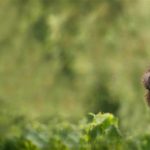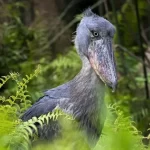
Gorilla Trekking in Volcanoes National Park, Rwanda
October 7, 2025
The Shoebill Stork in Mabamba Wetland
October 15, 2025Hidden in Rwanda’s lush southwestern highlands, Nyungwe National Park is one of Africa’s most ancient and biologically diverse rainforests. Spanning over 1,000 square kilometers, it is a pristine world of mist-covered mountains, thick rainforest canopies, and an incredible array of wildlife. The park is best known for its chimpanzee trekking experience — an adventure that allows visitors to step into the heart of the forest and encounter our closest genetic relatives in their natural home.
Why Choose Nyungwe National Park for Chimpanzee Trekking
While most travelers come to Rwanda for gorilla trekking in Volcanoes National Park, Nyungwe offers a quieter and more intimate experience that’s equally rewarding. The park is home to over 400 chimpanzees, divided between two main regions — the main Nyungwe Forest and the smaller Cyamudongo Forest, an isolated fragment of the ancient forest.
The park’s dense vegetation and high-altitude climate provide an ideal habitat for primates. Beyond chimpanzees, Nyungwe hosts 13 other primate species, including:
-
L’Hoest’s Monkeys, one of Africa’s rarest species
-
Owl-faced Monkeys, shy and elusive
-
Grey-cheeked Mangabeys, often heard chattering in the treetops
-
Angolan Colobus Monkeys, which can be seen in large troops of up to 300 individuals
This biodiversity makes Nyungwe one of the top primate destinations in Africa, second only to Uganda in terms of species variety. The park’s isolation from heavy tourist traffic allows visitors to fully immerse themselves in the serenity of the forest and experience authentic, unspoiled encounters with nature.
The Chimpanzee Trekking Experience
Chimpanzee trekking in Nyungwe typically begins at dawn. Visitors gather at the Uwinka Visitor Centre or Gisakura for registration and a short briefing from the Rwanda Development Board (RDB) rangers. During the briefing, guides share details about chimpanzee behavior, safety rules, and the importance of conservation.
You then set off into the forest in a small group (usually no more than eight trekkers per group), accompanied by experienced ranger guides and trackers who have been following the chimps since early morning using vocal calls and fresh tracks.
The trek can take anywhere from one to four hours, depending on where the chimpanzees nested the previous night. The paths lead through thick forest, slippery slopes, and occasionally steep climbs — so good hiking boots and stamina are essential.
As you trek, the forest comes alive with the sounds of nature: the rustling of leaves, the echo of distant chimp calls, and the melodic chirping of hundreds of birds. When you finally locate the chimps, the forest seems to fall silent — then, suddenly, you’re surrounded by their calls and movement.
You’ll spend a full hour observing these intelligent primates as they feed, play, groom one another, and swing between branches. Their behavior is both fascinating and familiar — expressions of curiosity, affection, and mischief that remind us of our deep evolutionary connection.
Your guide will provide insights into their complex social structures, communication, and the conservation challenges they face. The experience is emotional, educational, and truly unforgettable.
Best Time to Visit Nyungwe for Chimpanzee Trekking
Nyungwe National Park is open year-round, but the dry seasons offer the best trekking conditions:
-
June to September
-
December to February
During these months, trails are drier and easier to navigate, and the weather is generally more pleasant.
However, trekking in the wet seasons (March–May and October–November) has its own advantages — the forest is at its greenest, and chimpanzees are often easier to find since food sources are abundant and they stay closer to the forest floor. Travelers should be prepared for muddy paths and frequent rain showers, but the lush scenery makes it worth the effort.
Conservation and Ethical Tourism
Chimpanzee trekking in Nyungwe plays a vital role in sustainable tourism and wildlife protection. The revenue from trekking permits (currently $90 per person) helps fund:
-
Park management and ranger patrols
-
Anti-poaching operations
-
Community development programs for nearby villages
-
Research and monitoring of primate populations
Ethical guidelines are strictly enforced to protect both the chimpanzees and visitors. Trekkers must:
-
Maintain a minimum 7-meter distance from the chimps
-
Avoid flash photography or loud noises
-
Stay quiet and calm during the encounter
-
Refrain from eating or drinking near the primates
These practices ensure that the chimpanzees remain undisturbed and that their natural behavior is preserved for future generations.
Other Activities to Enjoy in Nyungwe National Park
Nyungwe is not just about chimpanzees — it’s a complete ecological wonderland offering a variety of thrilling and educational experiences.
1. Canopy Walk
One of the park’s highlights is the famous Canopy Walk, a 200-meter-long suspended bridge that hangs 70 meters above the forest floor. It offers breathtaking panoramic views of the rainforest and a unique opportunity to spot birds, monkeys, and butterflies from above the treetops. It’s the only canopy walk of its kind in East Africa and a must-do for visitors.
2. Birdwatching
With over 300 recorded bird species, including 29 Albertine Rift endemics, Nyungwe is a paradise for bird lovers. Some of the notable species include:
-
Great Blue Turaco
-
Rwenzori Turaco
-
Red-collared Mountain Babbler
-
Grauer’s Rush Warbler
Guided birding tours are available, and the park’s varied elevations offer diverse bird habitats — from bamboo zones to swampy wetlands.
3. Hiking and Nature Trails
Nyungwe offers over 15 hiking trails, each offering a unique experience. Some popular trails include:
-
Igishigishigi Trail – Easy, with stunning canopy views (ideal for the canopy walk).
-
Isumo Trail – Leads to a spectacular waterfall deep in the forest.
-
Uwinka Trail – Known for its scenic viewpoints and wildlife sightings.
These hikes range from 1–8 hours and allow visitors to explore the forest’s waterfalls, orchids, and hidden wildlife.
4. Colobus Monkey Tracking
Another exciting primate experience is the black-and-white colobus monkey trek, where visitors can observe massive troops of these elegant monkeys, sometimes numbering over 300 individuals — one of the largest recorded populations in Africa.
5. Cultural Experiences
After trekking, you can visit nearby communities to learn about traditional Rwandan culture, including local crafts, drumming, and dance. The communities surrounding Nyungwe are actively involved in conservation and benefit from tourism revenues.
Where to Stay in Nyungwe National Park
Nyungwe offers accommodation for every budget and preference:
-
Luxury:
-
One&Only Nyungwe House – A world-class eco-lodge nestled within a working tea plantation. Offers gourmet cuisine, spa treatments, and guided nature experiences.
-
-
Midrange:
-
Nyungwe Top View Hill Hotel – Known for its hilltop location and panoramic views of the forest and Lake Kivu.
-
-
Budget:
-
Gisakura Guesthouse – A cozy, affordable option near the park’s western entrance, perfect for backpackers and budget travelers.
-
All lodges are within easy reach of trekking departure points and offer warm Rwandan hospitality.
Conclusion
Chimpanzee trekking in Nyungwe National Park is a journey that combines wildlife, adventure, and conservation in one breathtaking setting. It’s a rare opportunity to walk through one of Africa’s last untouched rainforests and stand just a few meters away from chimpanzees in their natural environment.
Beyond the excitement of the trek, Nyungwe offers peace, reflection, and connection — to nature, to wildlife, and to the rhythms of the forest itself. Whether you’re a passionate nature lover, photographer, or first-time visitor to Rwanda, a trip to Nyungwe is sure to be one of the most memorable experiences of your life.
